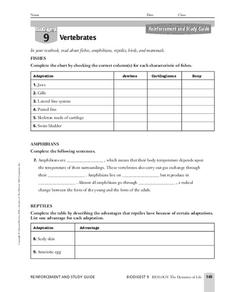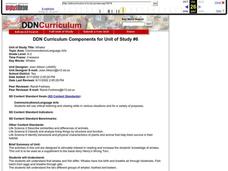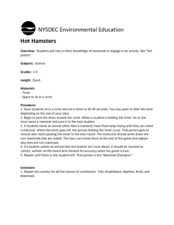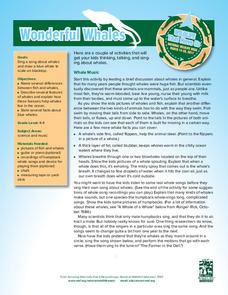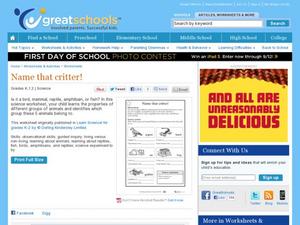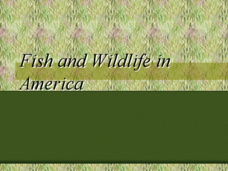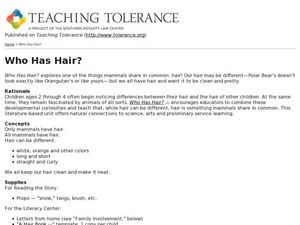Curated OER
Fishes
In this fish worksheet, high schoolers will review the characteristics of fish by comparing the jaws, skeleton, and fertilization of each fish class. Then students will use a phylogenetic tree to compare the groups of fish to ancestral...
Curated OER
Vertebrates
In this vertebrate worksheet, learners review the different adaptations for the 5 groups of vertebrates: birds, mammals, reptiles, amphibians, and fishes. This worksheet has 12 matching, 1 fill in the blank, and 7 short answer questions.
Curated OER
Whales
Students compare the differences between whales and fish. They examine the differences of toothed and baleen whales. They identify behavioral and physical characteristics of animals that help them survive in their habitat.
Curated OER
Hot Hamsters
Using this quick activity, you can have your class review what they have learned about mammals. Learners sit in a circle, and take turns naming a mammal. This activity could be enriched by having learners go to their desks, identify a...
Curated OER
Find the Ocean Mammals
In this ocean mammals activity, students view three lines of fish and choose the mammal found in each row that does not live in the ocean. Students circle their answer in each line and then color the activity with appropriate colors.
Curated OER
Fishes
In this fish worksheet, students will use fish characteristics vocabulary words to fill in the blanks of 3 statements and a crossword puzzle.
Curated OER
Wonderful Whales
Primary marine biologists consider the largest living animals on Earth, the whales. Introduce them to general anatomy, unique adaptations, and behaviors. Teach them to sing a song that will help them remember some of these facts....
Curated OER
Types of Animals
Learning about animals, and their classifications, is a regular part of the elementary-school curriculum. Using this presentation, learners can review information relating to animal classification, and test their knowledge. This would be...
Curated OER
Name That Critter
Young learners classify five different animals into their proper category. The animals pictured are a pigeon, a lizard, a cat, a frog, and a goldfish. Pupils are also asked to tell why they know it's a certain kind of animal. An...
Larson Lab
Animal Classification
How are animals classified? Scholars explore animal classification by observing non-living and living specimens. They learn how to organize animals into vertebrates and invertebrates and identify the five vertebrate groups: mammals,...
Twisty Noodle
Fur, Features, Scales, and Shells Book
What's the difference between a bear and a fish? Examine the characteristics of different animals with a set of pages for kids to color. Four pages provide different animals for each characteristic, including turtles, bears, fish, and...
Curated OER
Classification of Animals
First graders investigate the characteristics of vertebrates. They classify each as mammal, fish, bird, and reptiles. Students explore the differences between various types of animals and classify each.
Curated OER
Fish and Wildlife in America
Some of the details of the use of wildlife as food and crop resources are given at the beginning of this slideshow. Next, the historical problems with wildlife are explained, as are some mistakes that have been made leading to extinction...
Curated OER
Verterbrate Classification
Students are introduced to the broad categories of vertebrates including fish, amphibians, reptiles, birds and mammals. They identify the characteristics of each group and then view slideshows and video of example species.
Curated OER
How Are Animals Grouped?
In this animal grouping worksheet, students compare and contrast the characteristics of mammals, birds, and fish. This worksheet has 9 fill in the blank questions in a graphic organizer.
Curated OER
Baleen Whales vs. Toothed Whales
Second graders review mammal characteristics and study two types of whales. In this mammal study lesson, 2nd graders discuss mammals and define their five characteristics. Students complete a whale worksheet and define differences...
Curated OER
Who Has Hair?
Students explore similarities and differences. In this Teaching Tolerance instructional activity, students read literature and participate in activities that features mammals and their hair. Students learn that they share things in...
Curated OER
Underwater Animals
Students investigate mammals and blubber. In this science lesson abut the sea, students perform an experiment that will help them in discovering how blubber keeps sea mammals warm.
Curated OER
The Sights and Sounds of Orcas
Students investigate the orca whale. They participate in an online Webquest, listen to whale vocalizations online, answer discussion questions, and locate and read newspaper articles on marine mammals and orca whales.
Curated OER
Animal Classification
Second graders identify characteristics of and group animals by the five categories of vertebrates.
Curated OER
Animals
Students become familiar with the need for categorizing scientific information, in this case, animals. They categorize the 5 groups of animals in a collage and answer questions about each.
Curated OER
Animals Around the World
Pupils study different kinds of animals and what group they belong to. In this animal classification lesson students view different animals and sort them by what group they belong to, for example a snake is in the reptile group.
Curated OER
Cloze Passage: Mammals in the Sea
In this mammals in the sea cloze procedure worksheet, students fill in the 12 missing words in the passage to help identify their reading level.
Curated OER
Which Animals Are Vertebrates?
In this vertebrate animals learning exercise, students will classify 5 animals as belonging to the bird, mammal, reptile, amphibian, or fish group.



